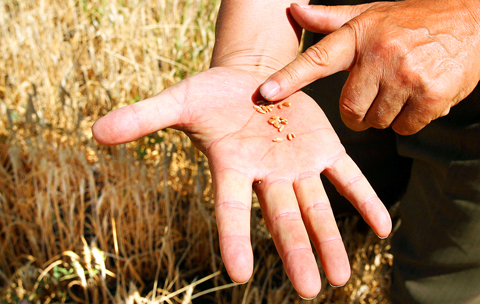Russian farm owner Ilshat Gumerov stands in the middle of his fields under the mercilessly hot sun with a look of despair on his face.
His 700 hectares in the central Volga region of Tatarstan has not been touched by a drop of rain in weeks amid one of the severest heat waves of the century in Russia. He already fears he has lost two-thirds of his harvest.
“It is a catastrophe,” he said, ruefully fingering the dried-up ears of wheat. “This year, I am going to make no profit. It will only be enough to buy fodder.”

PHOTO: AFP
No rain has fallen since April in this largely Muslim region 800km east of Moscow while temperatures over the last weeks have jumped over 30°C. And this after a bitter winter whose thaw destroyed winter crops.
The drought is not just bad news for Gumerov and thousands of other farmers across Russia but also for grain consumers worldwide and the country’s ambitions to become a leading global grain exporter.
Twenty-three of Russia’s 83 regions, mainly situated in the European part of the country, have declared a state of emergency over the drought.
According to the Russian Ministry of Agriculture, 10 million hectares of land have been destroyed by the heat wave, equivalent to about 20 percent of all of Russia’s arable land.
“The drought is extremely unusual because we have never seen such temperatures and such a lack of rain in the European part of Russia,” leading Russian agriculture expert Dmitry Rylko said.
Russian Prime Minister Vladimir Putin this week told First Deputy Prime Minister Viktor Zubkov to take the situation under “firmer” control.
“The situation is not getting better, it is getting worse,” Putin said bluntly.
According to Rylko, director of the Institute for Agricultural Market Studies, the problems have not been evenly spread across Russia, with the Volga region, including Tatarstan, the Urals and the southwest, suffering the worst.
By contrast, the harvest in Siberia and the south of Russia has been relatively strong, he said.
Tatarstan is one of Russia’s leading agriculture regions, with one-third of its land covered by the famous chernozem, the black earth known for its richness in humus formed by the decomposition of plant matter.
However, its earth and the large water resources in the Volga region have not been enough to temper the effects of one of the severest droughts in Russia in living memory.
The drought comes at the worst possible time for Russia, which has launched a drive to increase its share of the global grain market with the aim of more than doubling its grain exports to 40 tonnes to 50 million tonnes a year.
However, Rylko said it was likely that Russia is going to harvest only 80 million tonnes of grain this year, compared with 97 million last year.
Russian agriculture minister Elena Skrynnik said that the forecast for exports this year was set to be less than 20 million tonnes, down even on last year’s figure of 21 million tonnes.
Rylko said he hoped that the Russian agriculture market would be able to recover in the next two years. A full recovery in one year would be hard, as “after bad harvests you never have good harvests,” he said.

BACKLASH: The National Party quit its decades-long partnership with the Liberal Party after their election loss to center-left Labor, which won a historic third term Australia’s National Party has split from its conservative coalition partner of more than 60 years, the Liberal Party, citing policy differences over renewable energy and after a resounding loss at a national election this month. “Its time to have a break,” Nationals leader David Littleproud told reporters yesterday. The split shows the pressure on Australia’s conservative parties after Prime Minister Anthony Albanese’s center-left Labor party won a historic second term in the May 3 election, powered by a voter backlash against US President Donald Trump’s policies. Under the long-standing partnership in state and federal politics, the Liberal and National coalition had shared power

CONTROVERSY: During the performance of Israel’s entrant Yuval Raphael’s song ‘New Day Will Rise,’ loud whistles were heard and two people tried to get on stage Austria’s JJ yesterday won the Eurovision Song Contest, with his operatic song Wasted Love triumphing at the world’s biggest live music television event. After votes from national juries around Europe and viewers from across the continent and beyond, JJ gave Austria its first victory since bearded drag performer Conchita Wurst’s 2014 triumph. After the nail-biting drama as the votes were revealed running into yesterday morning, Austria finished with 436 points, ahead of Israel — whose participation drew protests — on 357 and Estonia on 356. “Thank you to you, Europe, for making my dreams come true,” 24-year-old countertenor JJ, whose

A documentary whose main subject, 25-year-old photojournalist Fatima Hassouna, was killed in an Israeli airstrike in Gaza weeks before it premiered at Cannes stunned viewers into silence at the festival on Thursday. As the cinema lights came back on, filmmaker Sepideh Farsi held up an image of the young Palestinian woman killed with younger siblings on April 16, and encouraged the audience to stand up and clap to pay tribute. “To kill a child, to kill a photographer is unacceptable,” Farsi said. “There are still children to save. It must be done fast,” the exiled Iranian filmmaker added. With Israel

Africa has established the continent’s first space agency to boost Earth observation and data sharing at a time when a more hostile global context is limiting the availability of climate and weather information. The African Space Agency opened its doors last month under the umbrella of the African Union and is headquartered in Cairo. The new organization, which is still being set up and hiring people in key positions, is to coordinate existing national space programs. It aims to improve the continent’s space infrastructure by launching satellites, setting up weather stations and making sure data can be shared across